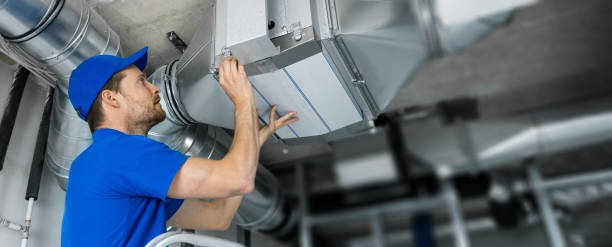Managing your home’s energy consumption can be an uphill battle, especially with an HVAC system that runs around the clock. Whether you’re trying to save some cash or just aiming to be more eco-friendly, optimizing your HVAC system is a fantastic place to start. Are you curious about how you can make a difference? Let’s look into some practical, simple steps you can take.
1. Upgrade Your Thermostat
First things first, your thermostat is the brain of your HVAC system. Investing in a smart thermostat can make a world of difference. These devices learn your schedule and temperature preferences, adjusting settings automatically to optimize energy use. Imagine your HVAC system powering down when you’re at work and kicking back in just before you get home. Cool, right?
Set Temperature Thresholds
The mantra “set it and forget it” is a lifesaver when it comes to HVAC energy savings. Establishing temperature thresholds can efficiently control energy usage. During the summer, set your thermostat to around 78°F when you’re home and 85°F when you’re away. In the winter, aim for 68°F while you’re home and lower when you’re out or asleep. It might only be a few degrees here and there, but the savings add up quickly.
2. Seal Windows and Doors
Drafty windows and doors are like the Bermuda Triangle of HVAC efficiency; energy just seems to vanish. Make it a weekend project to seal up those leaks with weatherstripping or caulk. If your windows are old, consider upgrading to energy-efficient models. Not only will your HVAC system thank you, but your wallet will thank you, too.
3. Regular Maintenance
A well-maintained HVAC system runs more efficiently. Regularly changing or cleaning the filters is one of the easiest ways to boost efficiency. Clogged or dirty filters force the system to work harder, meaning more energy consumption.
Schedule Professional Tune-Ups
Remember to schedule professional tune-ups at least once a year. During these inspections, a technician can identify and fix any potential issues that might be causing your HVAC system to work harder than it should. You wouldn’t skip routine check-ups for your car, so why neglect your HVAC? Regular AC maintenance services can extend the life of your unit and improve its efficiency.
4. Upgrade Your HVAC System
If your system is more than ten years old, it might be time for an upgrade. Modern HVAC systems are far more energy-efficient. While a new system might seem like a significant upfront cost, the energy savings over time make it a worthwhile investment.
Consider a Heat Pump
If you’re living in a milder climate, a heat pump can be an efficient alternative to traditional HVAC systems. They use less electricity, and newer models offer impressive performance. If you’re thinking about more energy-efficient options, consider exploring heat pump installation Southwest Florida. This region has the perfect climate to maximize the advantages of this technology.
5. Use Ceiling Fans
Ceiling fans are not just for summer. They can be used all year round to help distribute air more evenly in your home. In the summer, set the fan to rotate counterclockwise to push cool air down. In the winter, switch it clockwise to pull cool air up and push warm air down. It’s an inexpensive way to help your HVAC system maintain a comfortable temperature.
6. Insulate Your Home
Proper insulation ensures that the cooled or heated air stays inside your home, reducing the workload on your HVAC system. Attics, walls, and even your garage can benefit from added insulation. While this might be a bit of a project, the long-term energy savings are worth it.
7. Zone Heating and Cooling
Zone heating and cooling allow you to customize the temperature in different areas of your home. Why cool the entire house when you only spend time in a few rooms? Installing a zoning system can ensure that you’re only using energy where it’s needed. Plus, it might finally end those thermostat wars.
Install Dampers
A crucial part of zone heating and cooling involves the use of dampers. These devices control the flow of air within your home’s ductwork, allowing for precise temperature regulation in different zones.
8. Maintain Your Ductwork
Leaky ducts can lead to significant energy losses. Check your ductwork periodically for leaks and gaps. If you find any, sealing them up can prevent energy waste.
-
Use mastic sealant or metal tape to cover any gaps or leaks.
-
Consider a professional inspection if your ductwork is older or you suspect significant issues.
A professional service for your ducts can identify and fix issues you might not even know exist. It might be worth looking into ductwork repair services for a comprehensive evaluation and repair plan.
9. Avoid Blocking Vents and Registers
It might seem trivial, but ensuring that vents and registers are clear of obstructions can make a big difference. Move furniture and other items away from vents to ensure proper airflow. Blocked vents force your HVAC system to work harder, using more energy than necessary.
10. Use Window Coverings
Windows can let in a lot of heat during the summer and lose a lot during the winter. Using window coverings strategically can help mitigate this. In the summer, close blinds or curtains during the hottest parts of the day. During the winter, open them during the day to let sunlight naturally warm your home and close them at night to keep the warmth in.
11. Consider Solar Energy
If you’re looking to make a more significant investment in energy efficiency, consider solar panels. While the initial setup can be costly, the long-term energy savings can be substantial. Solar energy can power your HVAC system and reduce your reliance on the grid, making your home more energy-efficient and eco-friendly.
12. Get an Energy Audit
Last but not least, consider getting an energy audit. Many utility companies offer this service, sometimes for free. An energy auditor can identify areas where your home is losing energy and provide actionable recommendations for improvement. It’s an excellent way to get a comprehensive view of your home’s energy efficiency and make informed decisions.
Wrapping Up
Saving energy with your HVAC system doesn’t have to be complicated or expensive. Simple steps like upgrading your thermostat, sealing windows and doors, regular maintenance, and even using ceiling fans can make a substantial difference. While some initiatives, like insulation and zone heating, require a bit more effort, the long-term benefits make them worth considering. So why wait? Start implementing these tips today, and you’ll soon see the rewards in your energy bill and overall comfort.





